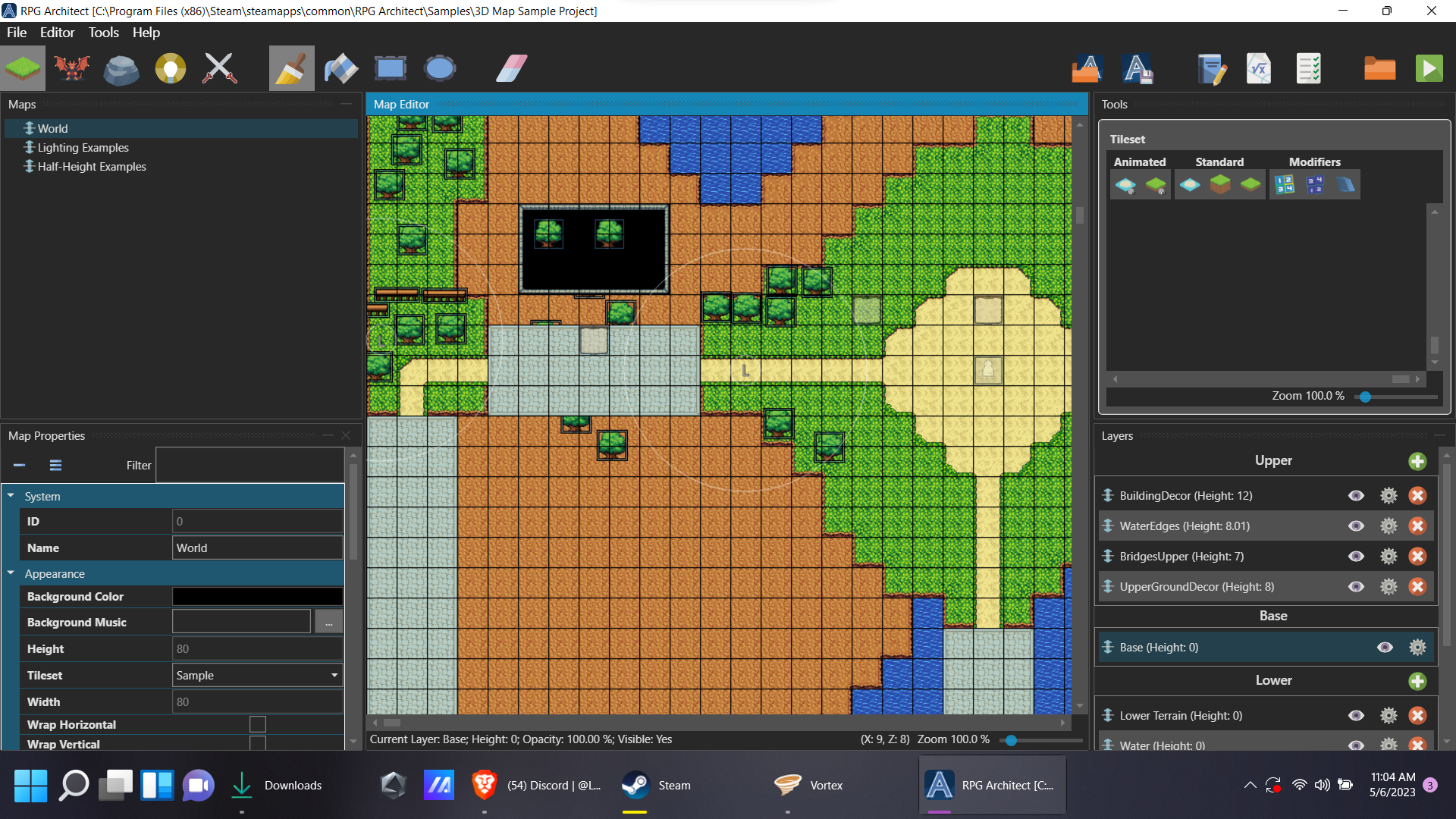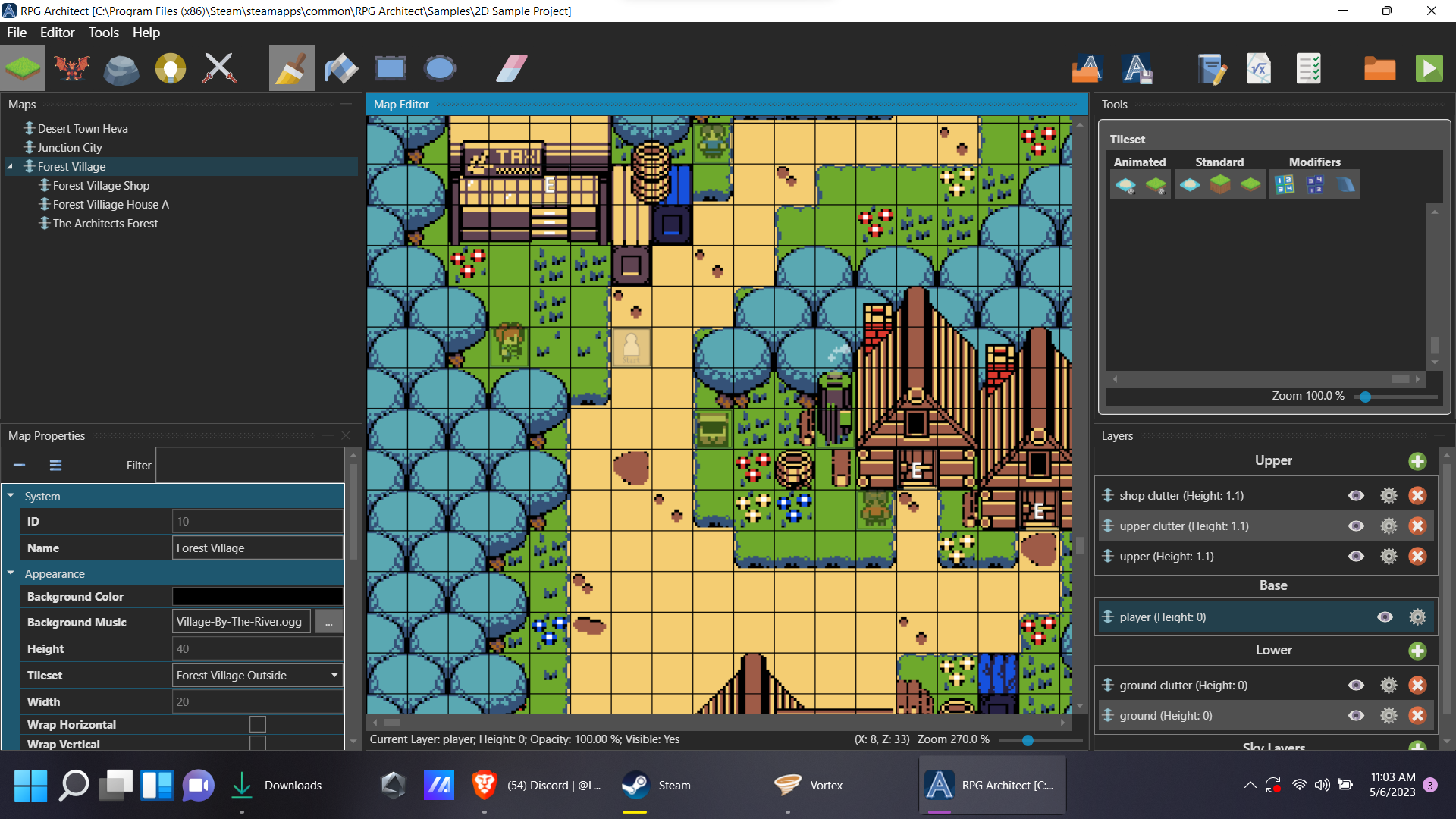Search
[{{{type}}}] {{{reason}}}
{{/data.error.root_cause}}{{{_source.title}}} {{#_source.showPrice}} {{{_source.displayPrice}}} {{/_source.showPrice}}
{{#_source.showLink}} {{/_source.showLink}} {{#_source.showDate}}{{{_source.displayDate}}}
{{/_source.showDate}}{{{_source.description}}}
{{#_source.additionalInfo}}{{#_source.additionalFields}} {{#title}} {{{label}}}: {{{title}}} {{/title}} {{/_source.additionalFields}}
{{/_source.additionalInfo}}- Details
- Category: Computer
- By Daniel Cullen
- Hits: 2939
RPG Architect (PC) (Preview)

RPG Architect
Developed By: Monster and Robot L.L.C.
Published By: Monster and Robot L.L.C.
Released: January 20, 2023
Available On: Linux, macOS, Microsoft Windows
Genre: RPG, Game Creation
ESRB Rating: none specified
Number of Players: Singleplayer
Price: $34.99
"Build a better mousetrap, and the world will beat a path to your door" -Ralph Waldo Emerson, attributed
I'd like to thank to thank Locke, of Monster and Robot L.L.C. for the review key to this program. They prior were interviewed by CCG, and this review is about the product we interviewed them on. The key for this review was provided as part of our agreement to do that interview, and no further promises were made except to have the below review be as honest and comprehensive as possible.
One of the gold standards for role-playing game development is RPG Maker. Being a longtime user of it, it's designed to essentially be a one-stop shop for even the most unskilled developer. However, it has many limitations, different versions, and feature disparity between them. Locke, the creator of RPG Architect, hopes to be the potential solution to this problem.
RPG Maker was designed to be a full-blown turn-based RPG creation suite. While it has branched out somewhat and added features as it's had new versions, it has removed some features between versions and often relied on its community to fill in the holes. RPG Architect is designed to be a continuous product. While the community will be able to fill in any perceived hole in their needs, the program is designed to not lose any features over time, merely hone and refine what is already there and add more as the product continues to develop.
While currently in early access and still in the process of firming up all key systems, RPG Architect already boasts a very wide array of built-in features. On top of supporting turn-based RPGs, it features the ability to create other types of games within the same engine. It has cross-platform support for Windows, Linux, and macOS, and the ability to import a wide array of file formats to accommodate the various game development resources provided by different artists, musicians, scripters, and so on.
The overall function and design is quite familiar to anyone who has used RPG Maker or any other similar game creation engine. It is a GUI-based program with a configurable database, the ability to add maps in a tile-based format (with support for 2D and 3D mapping), and a wide variety of options that can be selected and toggled with both a mouse and keyboard. Various buttons, menus, and other options are available, complete with some stock resources included by contributing artists, so aspiring game developers can create their own game from square one.
It's worth noting, while it draws inspiration from RPG Maker (and was created to address many of its shortcomings), RPG Architect is a bit more "fine-grained". Many things that were either added in various versions as specific features and removed in others like custom tile sizes or to some extent hard coded like the user interface are fully customizable and creatable from scratch. This means instead of using the "stock" templates for things like message boxes (which will be added into later versions of RPG Architect as it approaches a mature state), the code and design can be replaced with a user-modified version from the very basics in terms of coding, so if the creator wishes to custom build the engine to do what they see fit, that will be entirely possible.
The engine itself is proprietary, not open-source, but the code is not obfuscated either, so all the limitations of what the engine itself can do are limited strictly to the skill of the game designer and the limits of the engine framework. Like other engines, it can import other resources, provided they are licensed for such reuse, and it comes with stock resources by default provided by others who have contributed to the engine development.

Strong Points: Offers a wide array of features; highly responsive developer to feedback
Weak Points: Needs a lot of manual assembly for many components
Moral Warnings: Optional combat system
The editor and engine I am pleased to say are very stable and have extremely modest requirements. Even a very old computer could run the editor and most games, provided they can at least support system requirements for anything made after the early 2000s can meet or exceed. Requirements for games and the editor may increase depending on the quality of resources used and the power needed to render them, but so long as the user's PC can handle this, the editor and games should scale appropriately.
Being in early access, this has many features in a state that require lots of manual assembly. Unlike RPG Maker, which provides many ready-made stock templates for certain things like player movement and message boxes, these items will have to be created from scratch for now. Full-fledged RTP [Run-Time Packages, or basic assets used in common for most projects] packages and stock-made templates with a full basic feature suite are to be provided later. For now, it is highly recommended to follow the tutorials provided by their community Discord, Youtube, and site blog if you wish to make any serious use of the engine. The head developer has proven very receptive to feedback and largely intends to develop and refine features in response to the community that provides suggestions
and bug reports. I have reported a few issues during writing this review and can confirm Locke is very prompt and conscientious about their project and will regard all such reports with proper gravity.
Graphically, the editor uses a top-down format that should be familiar to anyone who has used game creation software like Unity, RPG Maker, or Unreal. The provided assets are incredibly cutesy pixel-based 2D characters, tiles, and other materials provided by contributors to the RPG Architect project. It has support for many well-known formats for game assets, ranging from NES style to certain types of 3D assets, and the expected resources it is compatible with should expand as the engine matures.
The sounds and music currently provided are suitable for various forms of RPG and other games, given the project name. Again, they are provided by contributors to the RPG Architect project. It has support for importing many common formats used by other game assets such as OGG and MP3. This is expected to also expand as the project reaches further maturity.
Both the editor and created games can make use of full mouse and keyboard support. Controller support for created games is not yet implemented but is a confirmed high priority of the developer, who has confirmed they desire to make all created games compatible with all types of gamepads supported by other Steam games and most consoles games will be likely to be ported to.

Higher is better
(10/10 is perfect)
Game Score - 88%
Gameplay - 17/20
Graphics - 8/10
Sound - 9/10
Stability - 5/5
Controls - 5/5
Morality Score - 94%
Violence - 7/10 (+3 if no combat)
Language - 10/10
Sexual Content - 10/10
Occult/Supernatural - 10/10
Cultural/Moral/Ethical - 10/10
Morally, RPG Architect, like many other game engines, has some stock resources but ultimately these are optional. All projects can be as morally clean or depraved as determined by the user of the editor.
Violence at present is limited to what the game developer wishes to include. One can make various RPG-style give orders and watch it happen in games or various types of platformer titles with violence. The stock resources are quite clean for this purpose and lack any display of blood or gore.
Language is completely clean by default. The only vile language is what the creator wants to add. Sexual content is absent from the stock resources, this is again added only at the discretion of the developer.
The stock resources are nigh entirely generic and would be inoffensive to all audiences. The game editor does have a generic winged being as the icon for adding "entities" (i.e. - characters or activator objects), but it resembles no particular fantasy creature save perhaps a generic picture of a gargoyle at absolute most, at least to me anyway. According to the developer, no deliberate demonic or other connotations were intended by this UI design choice.
Morally and ethically, all created games are as glorious or depraved as the user of the editor intends. The same projects included are utterly tame and just show off various game features achievable with the engine.
Overall, for an Early Access title, this is something of a slow-burn project that is confirmed will be actively developed for a very long time and further honed and polished. It's very rough at present, but it ships with lots of features one would have to pay for various RPG Makers to include already built in and even more will be added over time. It has a very good potential to exceed the limits of many basic game engines and even in its current state can support more than just RPG creation. For its price, it poises itself as a David that with time will utterly surpass Goliath without effort, and I frankly look forward to seeing its further growth and refinement.








